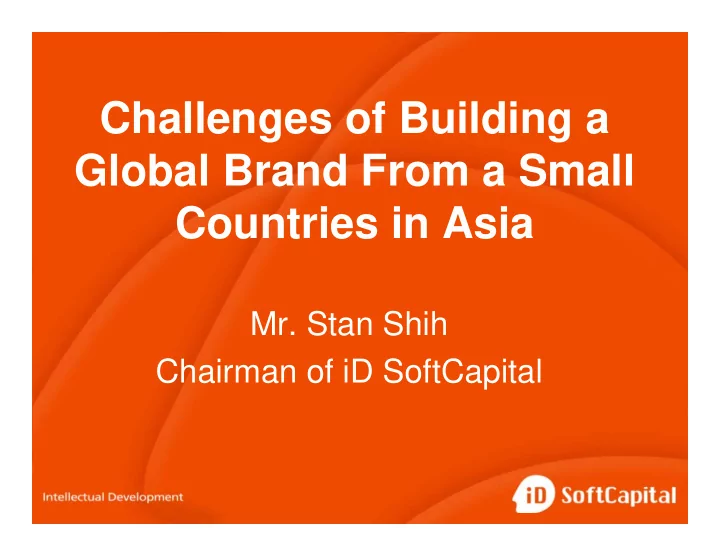

Challenges of Building a Global Brand From a Small Countries in Asia Mr. Stan Shih Chairman of iD SoftCapital
Entrepreneurship for new opportunities � About Acer � New paradigm of IT industries � Winning in a flat world � Branding and innovation � Building a global brand �
Entrepreneurship is the Key for Opportunities in Dis-integrated Industries � Dis-integration led the US company to become a “Computerless computer company” & “Fabless semiconductor company” � Many new great companies in IT/IC industries from the US & Taiwan in just 10~20 Years � A flat world does not favor a integrated large company � Entrepreneurship leads the evolution of industries eco-systems � Focus, simplify, and scale to win in the flat world
Spirit of Entrepreneurship Facing the uncertainty of creating � something from nothing Winning through innovations � Leaders with visions and strategies � Pursuiting self-achievements �
How to Establish a Successful Enterprise Invent more effective models � Benefit both others and oneself � Sustain the foundations of business �
Stan’s Basic Philosophy Me too is not my style � Challenge difficulty, breakthrough � bottleneck, and create value
Acer Way Exceeds the Old Paradigm � Team entrepreneurship, all-employees stockholding � Trust employee, share knowledge � Breakthrough bottleneck, globalizing brand � Networking organization, sustainable business
Evolvement of Acer’s Important Global Strategies 1976 Brought the US microprocessor technologies to Taiwan � 1981 Exported brand products � 1984 Started OEM business � 1986 Grand globalization plan, � Realization of dragon dream 1992 Global brand, local touch � (Re-engineering Acer) 2001 Separation of brand & ODM business � (New Millennium transformation)
New Era of Acer Group From Acer group to ABW (Acer, Benq, Wistron) � group in 2001 Successful retirement of Stan in the end of 2004 � ABW group revenue in 2007 US$43.2B, (Started � from Multitech in 1976 with US$25K capital)
Stan's Smiling Curve Added Value Branding/Service Intellectual Property Manufacturing Marketing R & D Global Competition Local Competition Concept in 1992
Stan's Smiling Curve Added Value Vertical Disintegration (Focus, Simple) Horizontal Integration (Scale, Cost effective) Manufacturing Marketing R & D Global Competition Local Competition Concept in 2001
Meet the Challenge of “The World is Flat” � The traditional way of thinking will continuously face concerns with “Hollowing-out of Industry ” � No country or company can enjoy all the competitiveness of all links in the value chain � Vertical integration of all activities in the value chain does not conform to economic principles � Dis-integration leads to a flat world � In a flat world, winners need to have a new way of thinking
The Strategic Positioning to Win in the “ Flat World ” Winners Are the integrators who can effectively integrate the optimal resources in the world Or Are the integratees who are leaders in a segment of each industry and who become the best alternatives in the world
Knowledge Economy is Brand Economy Brand: right end of the smiling curve � Brand is the most widely employed intellectual � property with the highest benefit Brand summarizes the knowledge of value chain � operation The value of knowledge without brand is limited �
Critical Factors of Building a Successful Brand Continuous innovation � Cost advantages in manufacturing and � Opexs for the long term Commitment to investment in brand image � Capability in both global and local � management
Brand and Innovation: Innovation is the Mother of Brands � Brands without innovation is a task half completed � Innovative technology, products, system, service, business model, etc., all contribute to brand building � Maintain continuous innovation and consistent brand image, otherwise they will not add value to the brand � B2C focuses on market-oriented innovation; B2B focuses on technology-oriented innovation
Market is the Driving Force of Innovation � Reward of innovation in a bigger market is more worthy to take risk. Why innovation is more popular in advanced countries? � Bigger markets � Can’t compete without innovation
What is Innovation � What is innovation? � Innovation � Create something new � Business innovation � Creative ideas + execution, leading to value creation
Brand Globalization Measurement Core advantages in product competitiveness � and innovation Capability of global management (talent and � experience) Breakthrough from stereotyped image about � the country Sufficient enthusiasm and long-term � commitment
Challenges from Global Management Difficult to recruit high-quality foreign talent � Lack of consensus or confidence between � headquarter and overseas staff Serious shortage in global management talent � The models from Europe, US or Japan may not � be applicable elsewhere
Effectively Enhance the Capability of Global Management � Actively invest and fasten the pace to develop talent in domestic & strategic market � Do things step by step and spend time on experience accumulation from a perspective of long-term investment � Establish the mechanism of interest sharing and regard global talent as partners in venturing � In acquiring global brands or enterprises, we should start from the small ones to the large and accumulate experience to reduce risks.
www.stanshares.com.tw Thank You!
Recommend
More recommend